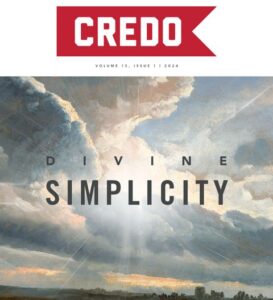The brutal winter was finally breaking in Mongolia. My children laughed in joy at the prospect of spring as they ran toward a park near our home. We could finally go outside without getting frostbite from the winds that froze the steppes.
I was not, however, the only one who watched my children play. A massive golden Buddha held the town in its gaze. In the idol’s shadow, I turned my heart to the triune God: “There is none like you among the gods, O Lord. Before them, I will sing your praise” (Psalm 86:9, 138:1).
The doctrine of divine simplicity teaches who God is, but the doctrine also has a polemical side. In His perfect simplicity, the triune God evaporates all other claims to divinity. This God is absolutely supreme. Even different forms of monotheism, which claim a version of simplicity, crash against the immovable reality of the one true God.
God’s simplicity is vital for missions in both its positive doctrinal content as well as its polemical side. The majesty of God’s simplicity generates and fuels missions and should be taught among the nations.
God’s Simplicity Inspires Missions
A long time ago, God’s glory glowed from a burning bush. In the rocky wilderness hills where sheep scavenged for food, God disclosed His covenant name to a shepherd in exile. God’s simplicity is traditionally connected with His name, YHWH (Exodus 3:14).[1] This name revealed His independence and freedom from creation. He is the great I AM. He alone is the absolute Being who eternally is, dwelling in the simple, uncompounded glory of his manifold perfections.
As He reveals His limitlessness, He also exposes our creaturely limits. He is utterly beyond our understanding. A glimpse of His infinite vastness evokes wonder: “Who is this? How unsearchable are his judgments and how inscrutable his ways! For from him and through him and to him are all things” (Mark 4:41; Rom 11:33,36). This wonder generates not only worship but also mission. Classical theism recognizes a biblical pattern of procession and return.[2] Everything flows from God and to God as the supreme and simple Being. He brings that which proceeds from Him back to Himself. He uses missions to accomplish this return.
The majesty of God’s simplicity generates and fuels missions and should be taught among the nations. Click To Tweet When YHWH spoke from the burning bush and gave a glimpse of His glory, Moses was sent out. Moses was an ambassador, sent with God’s staff and the command to say, “I AM has sent me to you” (Ex 3:14, 4:20). Moses proclaimed the name of the Lord in contested territory with false gods. Pharoah initially rejected Moses’s ambassadorial role: “Who is the LORD, that I should obey his voice and let Israel go? I do not know the LORD” (Ex 5:2). Yet, by the end of the story, Egypt and her gods are conquered, and the Lord’s identity as the all-powerful conquering Sovereign is displayed. He is YHWH, Lord of the nations, and He brings His people back to Himself.
Something Better than the Staff of Moses
Sometimes, in missions, you have strange and unnerving experiences. Our first night in Mongolia, I felt the presence of something in our hallway. Like a horror story, I slowly peered out of our bedroom down the hall. I saw, or thought I saw, a young Buddhist monk. He said, “This is my territory.” I blinked, and he was gone. In reflection, I do not know if it was spiritual warfare, a nightmare, exhaustion from jet lag, or all those combined. The unmoving eyes of the Buddha in Mongolia communicate the same: “This is my territory.” The gaze of the One who dwells in unapproachable light, though, pierces through this false claim.
God’s absolute simplicity upholds missionaries in their ambassadorial roles. In response to who God is, wonder and worship fuel them in the task. What keeps the missionary from running away from spiritual warfare and suffering is the reminder that the true God transcends all rival claims of jurisdiction or authority.
Like Moses, we are sent out from God as ambassadors, and we bring the nations back to Him through gospel proclamation. We, however, have something better than the staff of Moses to bring the nations back to Him. We possess, as much as possible for finite creatures, the “light of the knowledge of the glory of God” (2 Cor 4:6). The New Covenant reality based on the visible mission of the Son (John 20:21) and the invisible mission of the Spirit (John 14:26) gives us a better glimpse of God’s glory. As we proclaim His name among the nations, we experience the indwelling fullness of God in a creaturely way. The God who alone is the simple fullness of Being not only sends us out but dwells in us and powerfully works in us, like a shining treasure in a jar of clay (2 Cor 4:7; Eph 3:30).
The theologian must bring his tome to the mission field, and the missionary must take time to think and study deeply. Click To Tweet At the same time, missionaries are not like some versions of the Buddhist bodhisattvas, beings who help others meld into the cessation of eternal nirvana. Even after salvation and glorification, the distinction between Creator and creature remains. He alone is eternally simple. We receive from the fullness of the eternal God, and we simply point others to Him.
Indispensable Doctrine for the Nations
Someone may recognize the essential doctrine of God’s simplicity, but ask: is this something we should teach in non-Western settings? An author once captured the perceived dichotomy of missionaries and theologians by their respective caricatures.[3] The missionary is pictured among people with painted faces or people in strange (or little) clothing. The theologian, meanwhile, is cloistered away with his spectacles and pen, reading books in Latin. Still, these disciplines are intrinsically related. The theologian must bring his tome to the mission field, and the missionary must take time to think and study deeply.
Divine simplicity is indispensable for building up the faith in every cultural setting. This doctrine has a long history of providing apologetic clarity. Around 180AD, Irenaeus undermined gnostic beliefs in the emanations of Aeons with the doctrine of simplicity.[4] Irenaeus’s apologetic use of simplicity against Gnosticism can be applied to Hinduism, Buddhism, and Mormonism. Simplicity helps missionaries as they defend the faith and show why the God we serve is different than the gods of the nations.
Mongolian believers in the town we lived in remember the day a significant wind came up and knocked the head off the giant Buddha idol. The head was powerless, rolling around on the ground in the wind. Yet, Mongolians and believers worldwide need doctrinal instruction to understand the infinite greatness of God, who cuts off the head and hands of pretenders (1 Sam 5:4). The doctrine of divine simplicity provides that instruction. It is not some Western concept or a hangover from Hellenistic philosophy. This doctrine inspires worship and praise, sustains missionaries, and provides apologetic clarity.
Since the glory of God’s simplicity generates and fuels missions, should we not teach it among the nations?
Endnotes:
[1] Bavinck, Reformed Dogmatics, 2:123.
[2] Pseudo-Dionysius, Divine Names, 705D. Dominic Legge, The Trinitarian Christology of St Thomas Aquinas, (Oxford University Press, 2017), 12.
[3] Timothy Tennent, Theology in the Context of World Christianity (Zondervan, 2009), KindleLoc.158.
[4] Especially, Irenaeus, Against Heresies II.13.3.
Image credit: Andrew Milligan sumo


